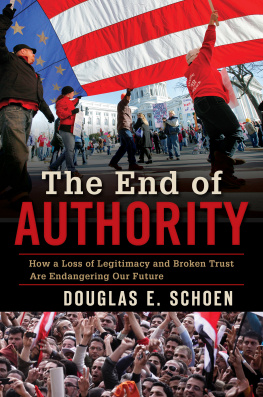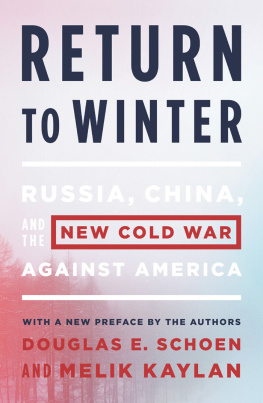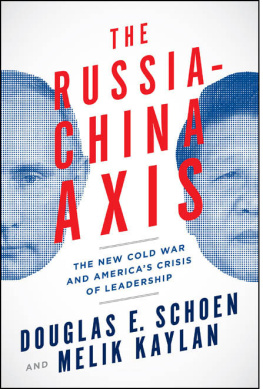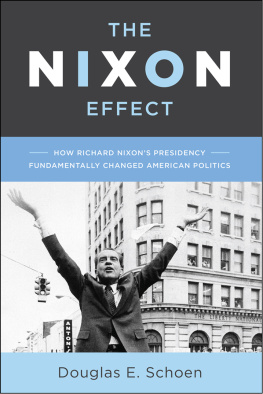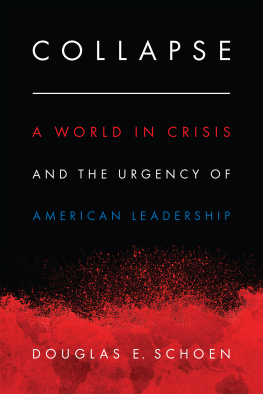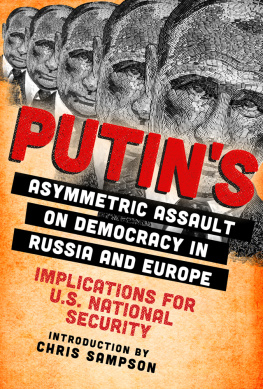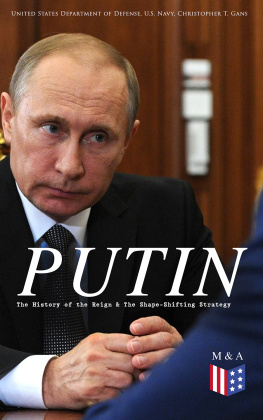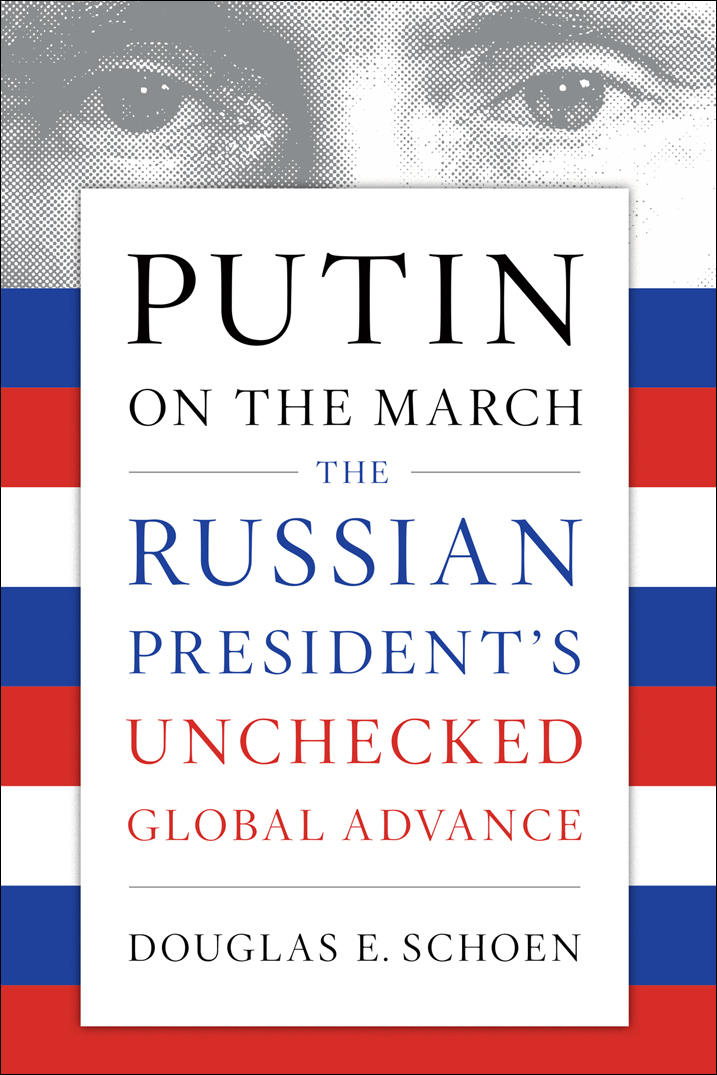Table of Contents
Guide


2017 by Douglas E. Schoen
All rights reserved. No part of this publication may be reproduced, stored in a retrieval system, or transmitted, in any form or by any means, electronic, mechanical, photocopying, recording, or otherwise, without the prior written permission of Encounter Books, 900 Broadway, Suite 601, New York, New York, 10003.
First American edition published in 2017 by Encounter Books,
an activity of Encounter for Culture and Education, Inc.,
a nonprofit, tax exempt corporation.
Encounter Books website address: www.encounterbooks.com
The paper used in this publication meets the minimum requirements of ANSI/NISO Z39.48 1992 (R 1997) (Permanence of Paper).
FIRST AMERICAN EDITION
LIBRARY OF CONGRESS CATALOGING-IN-PUBLICATION DATA IS AVAILABLE
EBOOK: 978-1-59403-998-0
Interior page design and composition by BooksByBruce.com
Contents


How does a nation with a weak and vulnerable economy and inferior military go on an international military and intelligence winning streak the likes of which havent been seen in years? How does a nation with a fraction of Americas striking power exert its will in the Middle East and Eastern Europe and sow doubts about the legitimacy of American democracyfurther polarizing and dividing an already-divided superpower?
How does Russia win?
DAVID FRENCH, NATIONAL REVIEW
[Russian information warfare is] about destabilizing democracy and pitting us against each other to limit the influence of the United States on the world stage.
JONATHON MORGAN, FORMER STATE DEPARTMENT OFFICIAL
R emember the 2012 presidential election, during which President Obama held off the challenge of the Republican nominee, Mitt Romney?
Remember the debates? There were three. In the first, Romney scored a decisive win over an off-his-game Obama. In the second, in the town hall format, the president rallied and had a good night. And in the third, devoted to foreign policy, the two candidates had this exchange:
OBAMA: Governor Romney, Im glad that you recognize that Al Qaeda is a threat, because a few months ago when you were asked whats the biggest geopolitical threat facing America, you said Russia, not Al Qaeda; you said Russiathe 1980s, theyre now calling to ask for their foreign policy back because, you know, the Cold Wars been over for 20 years...
ROMNEY: Russia does continue to battle us in the U.N. time and time again. I have clear eyes on this. Im not going to wear rose-colored glasses when it comes to Russia, or Mr. Putin.
Obama won the soundbite war, and he won the election. But five years later, it is clear that Romneys warnings were correct and that Obamas dismissals of Vladimir Putins Russia were woefully, damagingly wrong.
Moreover, something else is clear: Putin and Russia are winning at every level in which they are engaged, and there is little sign that their victories will be reversed.
What has Putin achieved since that October evening when Obama and Romney debated? Consider just the leading points: He has forcibly annexed Crimea from Ukraine, causing international condemnation for Russia but few other genuine costs; he has destabilized and weakened Ukraine, which is fighting a low-level war for its independence and survival. And in the course of moving against Kievin a part of the world Russia has always considered its near abroadPutin made a successful bet that the Western democracies, led by the United States, would do nothing to stop him. He was correct then and he appears to be correct still.
In the charnel house that is Syria, again with the condemnations of world leaders ringing in his ears, Putin boldly intervened on behalf of Bashar al-Assads dictatorship despite the risks of a military confrontation with the United States or other Western powers. Here, too, Putin bet that the United States and its Western allies, when push came to shove, would want no part of any fighting in Syria. They would talk, and they would levy sanctions, but if he held firm and stood by his ally, he would prevail. And he has. Assad is in power to stay, and Putin has made Russia a power broker in the Middle East.
Putins triumph in Syria has had the residual effect of causing a refugee crisis that is flooding Europe with desperate people, most of them Muslim and more than enough of whom are prone to radicalism and terror. European capitals are roiling with political anger and divisions over how to handle the influx of peopleor whether to accept them at all. The rise of nationalist, antiglobalist parties in most EU countries can in many cases be closely tied to the Syrian refugee crisis, a crisis that likely wouldnt exist had Washington pushed back on Putin in Syria when it had the leverage to do so.
Indeed, a quailing Obama basically outsourced US Syria policy to Russia by declining to enforce his red line on chemical-weapons use; during Trumps presidential campaign, he eagerly followed suit, seeking to enlist Putin as some kind of regional policeman, especially on ISIS, to keep us out of Syria. This refusal to act is a serious abnegation of the US leadership role in the world, suggestive of a deep isolationism born of populist disgust with elite foreign policy after Iraq.
The refugee crisis and the Western paralysis and disagreement over Syria have fostered deep divisions and instability in the Western Alliance. An EU official, speaking on the condition of anonymity to Radio Free Europe/Radio Liberty, called it Putins year, and said that the Russian leader was looking at a divided Europejust what he wants. The EU official was deeply concerned because the United States for the first time is providing no counterbalance to [Putin]. (More recently, he retracted that judgment.) No previous presidential candidate had ever questioned the centrality of the Western Alliance. Trump is a patriot, but his skepticismand, in my view, his naivetabout the vital role of the Western Alliance plays into Putins designs.
Under Putin, Russia forged a strong partnership with the Islamic Republic of Iran, just as Tehran was finalizing its nuclear deal with the United Statesa deal almost entirely on terms that will benefit the mullahs, not Washington. Along with its Syrian achievements, Russias new closeness with Iran makes it the new superpower of the Middle East. And just to make that point clearer, Putin has even reached out to Israel, which, after eight years of getting back-of-the-hand treatment from the Obama administration, was receptive to overtures from the Russian president.
Putin also continues to deepen his historic alliance with the Peoples Republic of China. What I have called the Russia-China Axis is the fundamental anti-Western, antidemocratic, anti-American force in the world today. And we remain ill equipped to deal with it, largely because we do not seem ready even to acknowledge its existence, its active moves around the world, and the implications it presents for our foreign policy.
Putins victories have provided positive propaganda for his antidemocratic, anti-Western model of governance. With China and Iran as his partners, he is exemplifying a different model than the democratic, free-market framework, which has been reeling for more than a decade from the shocks of war, financial instability, inept leadership, and economic stagnation. Putin offers antidemocrats around the world new hope that there is another way to do things. His is a bleak and depressing modelbut it is gaining ground, and not just in non-Western precincts. A portion of the right wing in Western democracies finds Putins nationalist brio, social conservatism, and contempt for opposition appealing and even inspiring.
Next page

